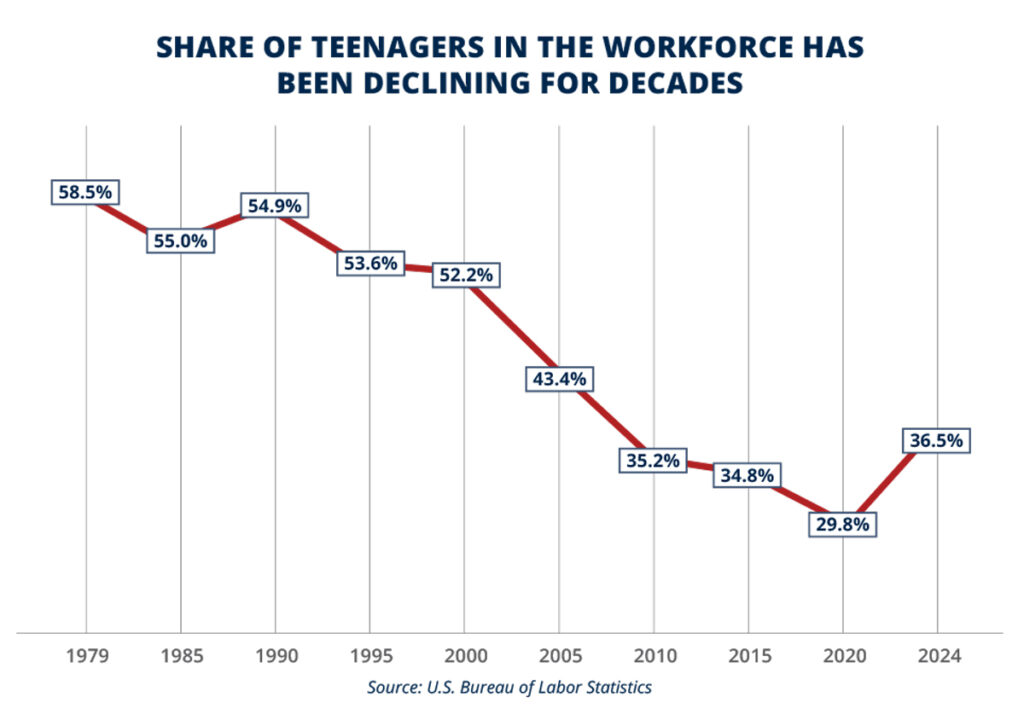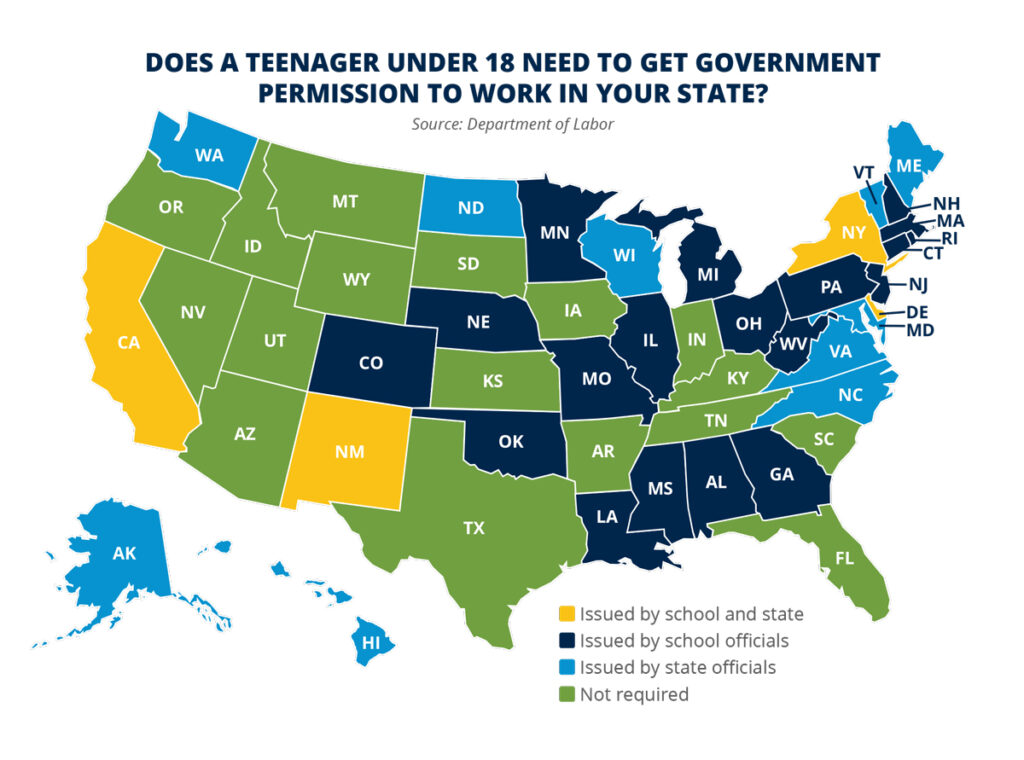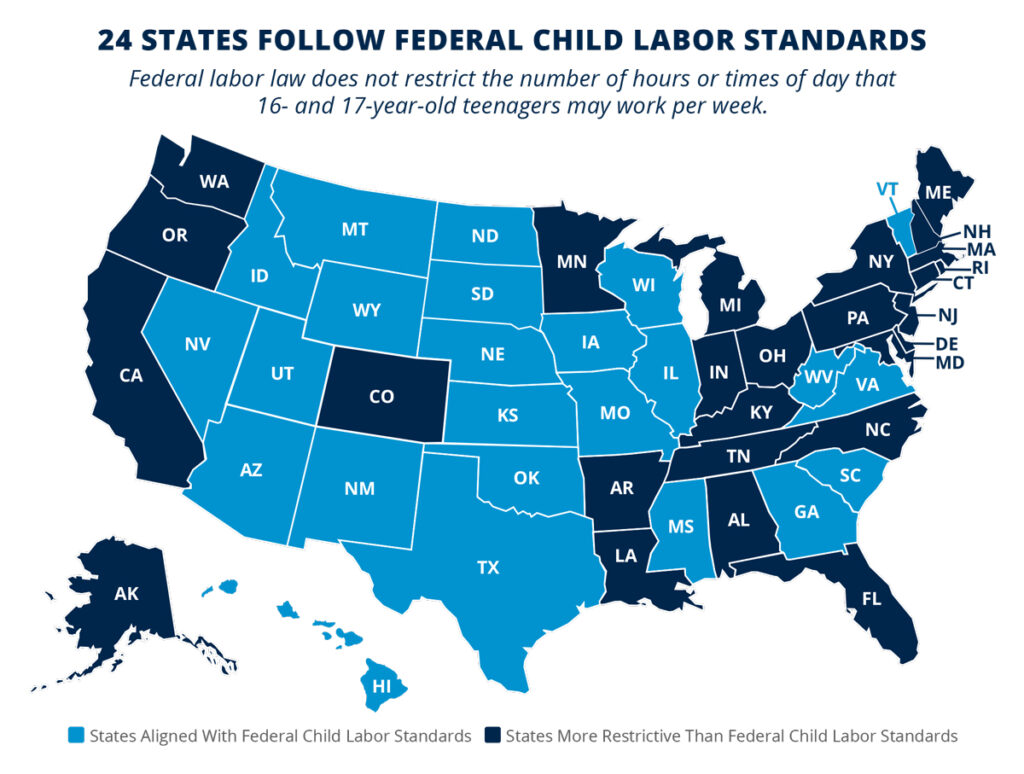How States Can Empower Families and Make It Easier for Teenagers to Find Their First Job
KEY FINDINGS
- Fewer teenagers work today than in previous generations.
- Teenagers who work have higher earnings as adults and learn important life skills.
- States should eliminate work permit requirements for teenagers.
- Lawmakers should roll back state laws that are more stringent than federal laws, aligning state and federal labor laws.
Overview
The number of teenagers who work part time has been sharply declining for decades. In 1979, around 58 percent of teenagers worked a part-time job.1 But by 2023, only 37 percent of teenagers were part of the workforce.2 In 2020, lockdowns caused teenage unemployment to surge to nearly 32 percent.3

It is beneficial for teenagers to gain work experience. A first job can teach life skills important for future careers, such as time management, professionalism, and customer service.4 Those who work as teenagers are also more likely to be employed as adults.5 Teenagers who earn their own money have an opportunity to learn financial literacy and budgeting.6

Those who work as teenagers have higher earnings in adulthood. Research shows that individuals in their twenties with teenage work experience have annual salaries that are 22 percent higher than those without teenage work experience.7 Additionally, disadvantaged young adults who work over the summer are 35 percent less likely to commit violent crimes and 57 percent lesslikely to commit other offenses, an effect that lasts in the years following the initial period of employment.8 Working during summer break is also linked to higher academic performance for teenagers.9 A recent study showed that teenagers who were employed had higher graduation rates and improved grades compared to their counterparts without jobs.10
Work provides teenagers with numerous benefits, and any teenager who wants to work should be able to do so without the government imposing unnecessary barriers. States should empower families by making it easier for teenagers to experience the freedom to work.

Work permits for teenagers create unnecessary barriers to employment
Federal law does not require teenagers to obtain a work permit as a condition of seeking employment.11 The Fair Labor Standards Act sets certain limits on the employment of those under the age of 18 that are designed to ensure that teenagers are protected from dangerous occupations and can succeed in school.12 The law limits the number of hours and times of day that teenagers aged 15 and under may work, prohibits all school-aged teenagers from working in hazardous occupations, and requires that employers keep a record of their teenage employees’ birthdates, as well as Social Security numbers, wages, and hours worked each day.13 Despite these established federal standards, many states impose additional requirements on teenagers who want to work.
Most young people choose to work in leisure and hospitality, retail trade, or education and health services industries.14 While these jobs are not considered hazardous, some states require a teenager seeking any job to obtain a work permit from the state, their school district, or sometimes both.15 For example, in Michigan, a teenager must get a work permit each time they change jobs,even for unpaid or volunteer work.16 In Ohio, teenagers who wish to get a job at a grocery store cash register or in an office must obtain a doctor’s note certifying that they are healthy enough to do so, in addition to obtaining permission from their school.17
Meanwhile states like Indiana, Arkansas, and Iowa have recently eliminated requirements that teenagers obtain a work permit, leaving the decision on whether a teenager can work with them, their parents, and the employers who want to hire them.18-20 In 33 states plus the District of Columbia, teenagers need government or school permission to get a job, while 17 states allow teenagers to work without obtaining a permit.21

More states should join the growing number of states that have prioritized allowing teenagers to work and lift work permit requirements.
States can do more to give teenagers the freedom to work
Work permits are just one way that states restrict work for teenagers. Some states have stricter laws than federal labor laws when it comes to work hours and work activities.
Lawmakers should roll back state laws that are more stringent than federal laws, aligning state and federal labor laws. Lawmakers should also create state-level exemptions for local teenage curfews, allowing young people to work earlier in the daytime and later in the evening.
Iowa recently led the way in making it easier for teenagers to work. In 2023, Governor Kim Reynolds signed legislation updating the types of work that teenagers may be involved in, allowing teenage employees to perform simple tasks such as operating a microwave oven, loading a vehicle, and doing laundry.22 While limiting involvement in hazardous occupations like mining is common sense, teenagers should not be prohibited from being paid to do tasks they likely already do in their own homes.
Employers report that they are less likely to hire teenagers due to laws restricting when they can work in the evenings.23 Iowa addressed this issue by allowing younger teenagers to work later in the evenings and ensuring there are not restrictions on the hours young adults aged 16-18 may work.24 School-sponsored and social activities often extend beyond dinnertime, and there is no reason why work activities should be limited in ways that other activities are not. Parents and teenagers should have the final say on free time, whether it is spending hours in the gym or earning money by waiting tables.
Importantly, federal law does not restrict the number of hours or times of day that 16- and 17-year-olds may work per week.25 And 24 states do not limit the hours or times of day these older teenagers may work, leaving work-related decisions to families.26

Another policy standing in the way of teenage employment are local curfews for teenagers. In 2023, Texas passed legislation to prohibit local governments from imposing curfews on people under the age of 18.27 States can encourage teenagers to work by requiring that local curfews include exceptions for teenagers who are working after-school jobs or are homeschooled.
THE BOTTOM LINE: States should empower families by making it easier for teenagers to experience the freedom to work.
Every teenager who wants to work should have the opportunity to work. A part-time job helps teenagers learn valuable career skills, financial literacy, and independence. Working can keep teenagers out of trouble and provides a pathway to future employment and success in adulthood.
State laws can create unnecessary barriers to work for teenagers, such as requiring them to apply for work permits, restricting their work hours, and preventing them from being paid to do simple tasks that they already do at home. States have the authority to change laws to allow teenagers and their parents to decide if they should work and what jobs they can do, instead of the government.

REFERENCES
1 Federal Reserve Economic Data, “Labor force participation rate – 16-19 yrs.,” Federal Reserve Bank of St. Louis (2023), https://fred.stlouisfed.org/series/LNS11300012.
2 Ibid.
3 Patrick Thomas, “Summer jobs dry up and teens face highest unemployment in decades,” The Wall Street Journal (2020), https://www.wsj.com/articles/summer-jobs-dry-up-and-teens-face-highest-unemployment-in-decades-11590312600?mod=RSSMSN&mod=article_inline.
4 Paul Harrington et al., “Signaling success: Boosting teen employment prospects,” The Commonwealth Corporation (2013), https://commcorp.org/wp-content/uploads/2013/04/resources_2013-04-signaling-success-boosting-teen-employment-prospects.pdf.
5 Ibid.
6 Alli Fick et al., “How states can streamline the hiring process for teenage workers and restore decision-making to parents,” Foundation for Government Accountability (2022), https://thefga.org/research/streamline-hiring-process-for-teen-workers/.
7 Paul Harrington et al., “Signaling success: Boosting teen employment prospects,” The Commonwealth Corporation (2013), https://commcorp.org/wp-content/uploads/2013/04/resources_2013-04-signaling-success-boosting-teen-employment-prospects.pdf.
8 Alicia Sasser Modestino, “How can summer jobs reduce crime among youth? An evaluation of the Boston summer youth employment program,” Brooking’s Metropolitan Policy Program (2017), https://www.brookings.edu/wp-content/uploads/2017/12/metro_2018jan_how-can-summer-jobs-reduce-crime-among-youth-final.pdf.
9 Neeta Fogg et al., “The 2017 summer jobs outlook for American teens,” Drexel University Center for Labor Markets and Policy (2017), https://drexel.edu/~/media/Files/clmp/projected-summer-2017-job-outlook-US-Teens.ashx?la=en.
10 Michael Jonas, “Summer jobs for youth pay off,” CommonWealth Beacon (2023), https://commonwealthbeacon.org/education/summer-jobs-for-youth-pay-off/.
11 Alli Fick et al., “How states can streamline the hiring process for teenage workers and restore decision-making to parents,” Foundation for Government Accountability (2022), https://thefga.org/research/streamline-hiring-process-for-teen-workers/.
12 Ibid.
13 Wage and Hour Division, “Records to be kept by employers,” Federal Register 56(230) 61100-61101 (1991), https://archives.federalregister.gov/issue_slice/1991/11/29/61095-61108.pdf#page=7.
14 Bureau of Labor Statistics, “Employment and unemployment among youth—Summer 2023,” U.S. Department of Labor (2023), https://www.bls.gov/news.release/pdf/youth.pdf.
15 Alli Fick et al., “How states can streamline the hiring process for teenage workers and restore decision-making to parents,” Foundation for Government Accountability (2022), https://thefga.org/research/streamline-hiring-process-for-teen-workers/.
16 Michigan Department of Labor and Economic Opportunity, “Work permit information,” State of Michigan (2023), https://www.michigan.gov/leo/bureaus-agencies/ber/wage-and-hour/work-permits.
17 Ohio Department of Commerce, “Minor work permits,” State of Ohio (2023), https://apps.com.ohio.gov/dico/minorworkpermit/.
18 Indiana Department of Labor, “Say YES to no more work permits!,” State of Indiana (2021), https://www.in.gov/dol/youth-employment/youth-employment-home/.
19 FGA, “Arkansas removes outdated policy, makes it easier for teens to work,” Foundation for Government Accountability (2023), https://thefga.org/blog/arkansas-removes-outdated-policy-makes-it-easier-for-teens-to-work/.
20 Iowa General Assembly, “Senate file 542,” State of Iowa (2023), https://www.legis.iowa.gov/legislation/BillBook?ba=SF542&ga=90.
21 FGA, “Let our youth thrive: Remove unnecessary work permit requirements,” Foundation for Government Accountability (2023), https://thefga.org/one-pagers/let-our-youth-thrive-remove-unnecessary-work-permit-requirements/.
22 Iowa General Assembly, “Senate File 542,” State of Iowa (2023), https://www.legis.iowa.gov/legislation/BillBook?ga=90&ba=SF542.
23 Paul Harrington et al., “Signaling success: Boosting teen employment prospects,” The Commonwealth Corporation (2013), https://commcorp.org/wp-content/uploads/2013/04/resources_2013-04-signaling-success-boosting-teen-employment-prospects.pdf.
24 Iowa General Assembly, “Senate File 542,” State of Iowa (2023), https://www.legis.iowa.gov/legislation/BillBook?ga=90&ba=SF542.
25 Wage and Hour Division, “Selected state child labor standards affecting minors under 18 in non-farm employment as of January 1, 2023,” U.S. Department of Labor (2023), https://www.dol.gov/agencies/whd/state/child-labor.
26 Ibid.
27 Texas State Legislature, “House bill no. 1819,” State of Texas (2023), https://capitol.texas.gov/tlodocs/88R/billtext/html/HB01819I.htm.
